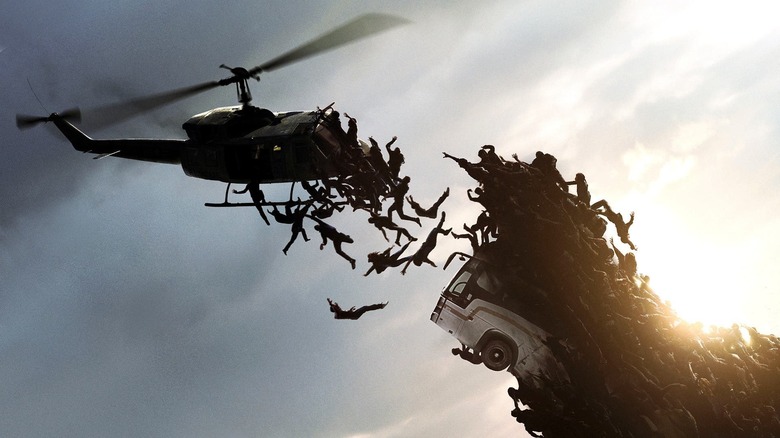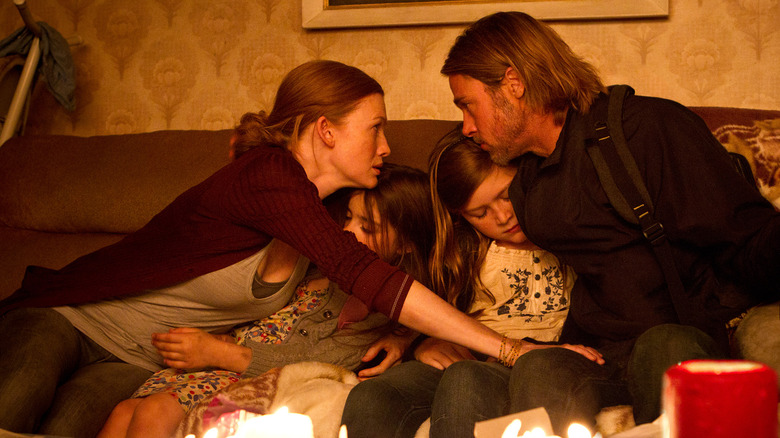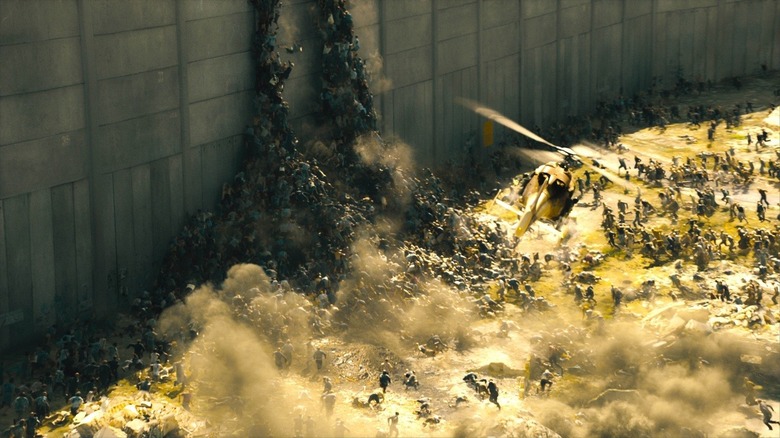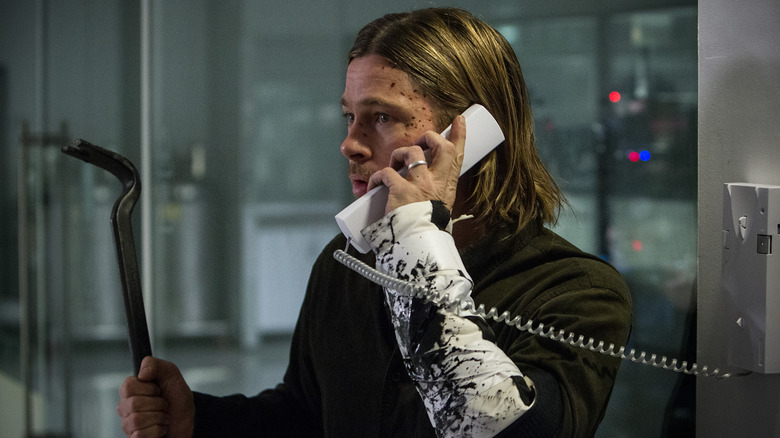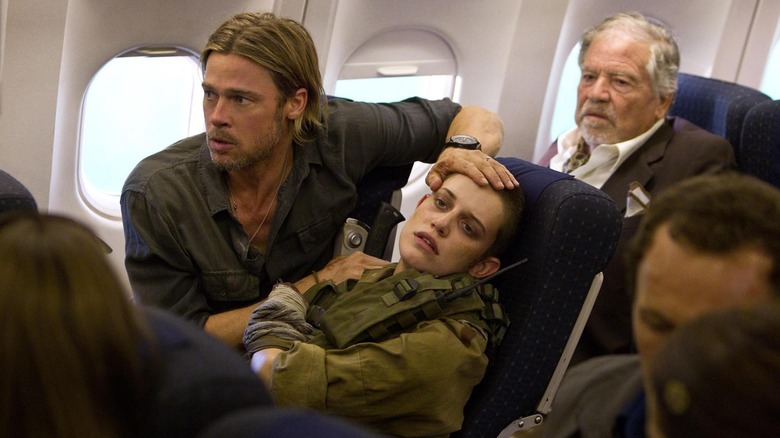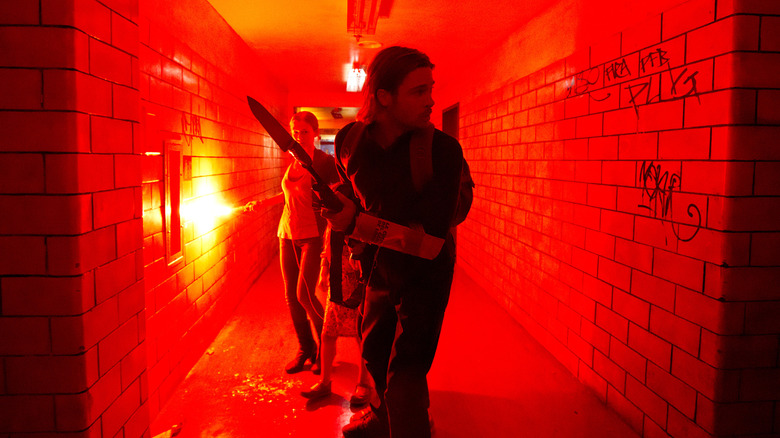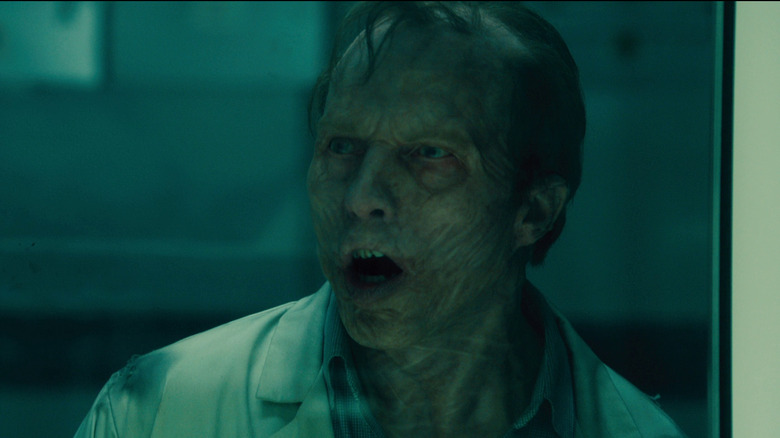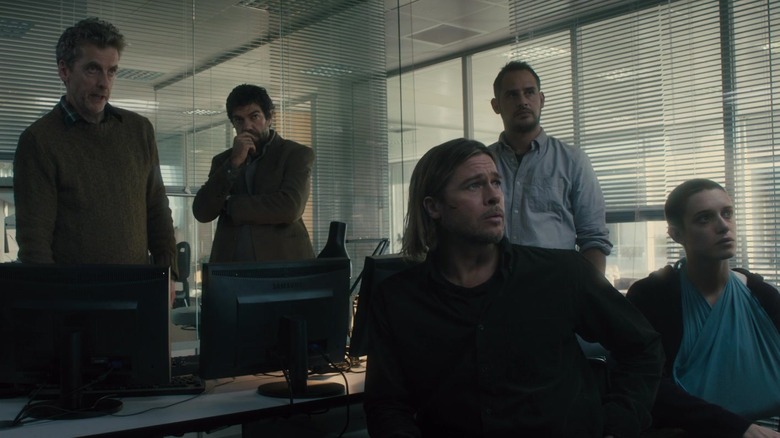Tales From The Box Office: World War Z Overcame Disaster To Become The Biggest Zombie Movie Ever
(Welcome to Tales from the Box Office, our column that examines box office miracles, disasters, and everything in between, as well as what we can learn from them.)
One reason that horror movies have remained such a constant in Hollywood is that they can be made on the cheap and, that being the case, bring the potential for high rewards. Just look at "The Blair Witch Project" or "Paranormal Activity," which were made for pennies and grossed hundreds of millions. But horror can also be a fertile ground for genuinely great storytelling, well beyond cheap thrills. That's what drew one of the world's biggest movie stars, Brad Pitt, to the genre when he turned "World War Z" into a passion project as both star and producer. The only problem? Pitt brought some pretty expensive tastes along with him.
"Can we take this genre movie and use it as a Trojan horse for sociopolitical problems, and what would the effect on the world be if everything we knew was upside-down and pulled out from under us?" Pitt said to The Hollywood Reporter in January of 2012, long before "World War Z," the disastrously expensive adaptation of Max Brooks' beloved zombie novel of the same name, hit theaters after one of the most infamously tumultuous productions in modern Hollywood history. Despite the eye-melting blockbuster budget, countless issues, breakdowns with the crew, and even a weapons raid, the film defied the odds to become the biggest zombie movie in the history of zombie movies — and one of the biggest horror movies ever.
In honor of the movie's 10th anniversary, we're looking back at "World War Z," how it came to be, what went wrong once cameras started rolling, how the budget ballooned to nearly $200 million in a historically cheap genre, what happened when the movie finally hit theaters after multiple delays, and what lessons we can learn from it a decade later. Let's dig in, shall we?
The movie: World War Z
One thing that should be said up top is that there is almost no way one could cover the scope of the disaster that went on behind the scenes during the production of "World War Z" in a single edition of this column. It's the sort of thing that deserves a tell-all book at some point. That said, we're going to try and paint a picture of how everything seemed to be working against this movie's success en route to its surprising level of success.
The movie's journey really starts with the book, which generated great interest from various studios even before its publication. Ultimately, Brad Pitt and his company Plan B landed the rights in 2006, with Paramount becoming the big studio partner. Pitt hand-picked Marc Forster ("Monster's Ball") for the gig. The director had never worked on an effects-heavy blockbuster such as this, though he did have the also troubled "Quantum of Solace" under his belt. It proved to be an issue (more on that in a bit).
First, they needed to set about adapting Brooks' novel, which is essentially a bunch of intimate, first-hand accounts of the zombie apocalypse. The movie that ultimately hit theaters is a big, global action-adventure flick that hardly resembles the novel in any way, shape, or form. That ended up being the case because a small army of writers wrote and rewrote the script many times all the way through the lengthy production process. It all began with Michael Straczynski, of "Babylon 5" fame.
The nightmare process of locking down the script
Straczynski had the unenviable task of adapting the much-acclaimed novel for the big screen, having to please, Pitt, Paramount, and the moneymen along the way. Brooks, for his part, didn't have any real say in the process. "Basically I have zero control. I'm actually okay with that. Seriously, I got all the control and creativity I needed writing the book. I'd don't want to see that diluted by dealing with a studio. I'd much rather step back and see the movie as a fan," Brooks said to Eat My Brains in 2006.
While Straczynski's draft would eventually receive acclaim after leaking online, the studio wasn't a fan of his take on the material. "They slammed the door so hard in my face it came off the hinges," the writer said of the reaction to his final draft in a lengthy piece from Vanity Fair published in 2013 ahead of the movie's release, detailing its nightmare production. Per Straczynski's account, they just had differing ideas when it came to what kind of movie they were trying to make.
"Marc wanted to make a big, huge action movie that wasn't terribly smart and had big, huge action pieces in it. If all you wanted to do was an empty-headed Rambo-versus-the-zombies action film, why option this really elegant, smart book?"
So, Plan B then hired Matthew Michael Carnahan ("The Kingdom") to do rewrites, and that script deviated heavily from the source material that got this film going in the first place. "There was a script that [J. Michael] Straczynski had written and they wanted me to come in and see if I could do some work on that. That's my roundabout way to 'World War Z.' It was a six-week rewrite that turned into a two-year odyssey," Carnahan said to Movieweb in 2019.
The rewrites begin
In that same Movieweb interview, Carnahan explained that he felt Straczynski's script would have been a better third movie in a then-planned trilogy. Let us not forget that Paramount saw this as a franchise, with a sequel that was very nearly directed by David Fincher before being scrapped altogether. But to get the hooks in the audience, you have to show the "war" of it all, Carnahan reasoned.
"I rewrote the whole script because I thought, if you call something World War Z and don't show World War Z, you're gonna run afoul with the vast majority of the audience that had never read the book."
There are many somewhat conflicting accounts of what happened once cameras began rolling in the summer of 2011 but Paramount was planning to shell out at least $125 million for the film — which is what a superhero movie might go for. Zombie movies? Zack Snyder's "Dawn of the Dead" seemed expensive at $28 million. We're talking about a historically cheap genre to play in. In the end, the budget would balloon well beyond that already astronomical figure. Forster, Pitt, and the brass at the studio also had to contend with the fact that the script was far from nailed down when filming began. This would come back to haunt them.
It was a globetrotting shoot with hundreds of extras, massive action set pieces, and tons of complex visual effects. Budget issues quickly emerged, causing problems behind the scenes at Paramount. "No one came to me and said, 'You are f*****g up here,' " Forster said in the Vanity Fair piece. "So if there are any issues budgetarily, they are not my issues."
Over budget and out of control
That quote from Forster is quite telling, as the chaotic production led to a great deal of stress for all involved. Naturally, there is going to be some finger-pointing and attempts to shift around the blame. Rather than go over all of the alleged issues, such as Pitt and Forster allegedly having some pretty serious communication issues on set, it's best to go over some of the bigger issues that came up just to give some idea of how bad things got.
For one, when the crew finished shooting in Malta, the Vanity Fair piece reveals that forgotten purchase orders were found after the cast and crew had already left which totaled millions, adding a great deal to the budget that hadn't been factored in. There was also Oscar-winning visual effects supervisor John Nelson ("Gladiator"), who was replaced after production wrapped up due to clashes with Forster. Paramount also was determined to keep it PG-13, even though much of the violence was venturing closer to R-rated territory. As for the spiraling money issues? At some point, Adam Goodman, then-president of Paramount, put his foot down.
"We did not give them extra money. When you are that deep in production and your budget has taken hits along the way, you put it back on the filmmakers and say, 'You've got to absorb those hits and figure out how to make the best with what you have here.'"
And that's not even the craziest part. Rather famously, a SWAT raid occurred in Budapest, with the officers raiding a warehouse that was holding weapons that were to be used in the film. More than 80 fully-functional firearms were seized. The problem was apparently that the guns entered the country with paperwork claiming they were non-functional. However, they were very much in working order. This much-publicized issue did not at all help the film's already out of control budget.
Nailing down the ending
One of the biggest of big problems that needed to be sorted out was the film's ending. An expensive, action-heavy ending was shot that would have taken place in Russia. The ending as we know it is far more tame, with Pitt's character going to the World Health Organization headquarters to find a potential cure. That ending was largely the product of Damon Lindelof ("Lost"), who was brought in at the 11th hour to try and save the film.
Lindelof watched a 72-minute cut with an ending that was an "incoherent montage of footage smashed together," per the Vanity Fair piece. "I said to them, 'There are two roads to go down here.' Is there material that can be written to make that stuff work better? To have it make sense? To have it have emotional stakes? And plot logic and all that? And Road Two, which I think is the long-shot road, is that everything changes after Brad leaves Israel."
Paramount went with option B, the far more expensive option. Lindelof alone didn't have time to do the necessary overhaul to the third act. So, Drew Goddard ("The Cabin in the Woods") came in to help out as well. Speak with Creative Screenwriting, Goddard reflected a bit on his contributions, saying the following:
"The big lesson of World War Z was that Paramount, Plan B and Brad Pitt simply said, 'Let's take the time to make this movie the best version of the movie before we put it on the screen for audience.' That doesn't happen a lot. A lot of times they just throw the movie out there and say, 'We'll make all our money opening weekend and then the movie will go away.' I came away from it thinking, 'Why don't we do this on more movies?'"
The financial journey
Why don't more movies handle things that way? Because the final budget for "World War Z" was said to be at least $190 million. That's an awful lot of money for a zombie movie — even if it does star Brad Pitt. Be that as it may, with an army of talented writers, piles of extra cash, and weeks of additional shooting, the movie was finally in the can, ready for the moviegoing public to judge. Paramount had to shift the release date several times, with the reshoots pushing it out of December 2012 to the summer of 2013.
"World War Z" ended up hitting theaters on June 21, 2013. That was a pretty packed few weeks, with Zack Snyder's "Man of Steel" arriving the week before, and Pixar's "Monsters University" serving as direct competition for Forster's big zombie blockbuster. While "Monsters" took the top spot with an $82.4 million haul, "Z" managed to hold its own with a better-than-expected $66.4 million performance.
Mind you, this was when "The Walking Dead" was near its peak, giving zombies a newfound relevance in pop culture. That certainly didn't hurt. The film managed to stay in the top five for a few weeks, even as "The Heat," "White House Down," "Despicable Me 2," and "The Lone Ranger" entered the fold. Fortunately, "The Lone Ranger" flopped pretty hard, which helped Paramount's situation here.
In the end, "World War Z" finished its run with $202.3 million domestically and an even better $337.6 million internationally, for a grand total of $540 million worldwide. That makes it one of the five highest-grossing horror movies of all time, just behind "I Am Legend" ($585 million) — which was arguably even less of a horror movie. Granted, the inflated budget cut into the studio's earnings but, with a haul of that size, disaster was averted. Seemingly against all odds, "World War Z" became a global smash hit.
The lessons contained within
There is much to be said about "World War Z" a decade removed. What's perhaps most surprising is that the movie itself doesn't resemble the disaster that the production suggested it would probably be. It's a miracle on so many levels. It's a miracle a zombie movie was able to justify a budget in the $200 million range. It's a miracle that this army of writers and clashing forces was able to pull it all together and make it work. It probably shouldn't have worked, but it did.
Still, one would be hard-pressed to look at this as a through-and-through success story. For one, Brooks' source material was more or less left in the dust in favor of something more popcorn-flavored which, admittedly, audiences ate up. Yet, there was more to be done in this universe, which is why Pitt worked so hard to get a sequel going for so long — even somehow convincing Fincher, coming off of "Gone Girl," to direct the thing. Perhaps most telling of all, Paramount declined to pull the trigger on a Pitt/Fincher team-up as a sequel to a movie that grossed $540 million worldwide. That speaks volumes of the experience making the first movie. Why tempt fate by going down that road again?
In an era when franchise movie budgets are spiraling out of control very regularly, this movie's avoidance of disaster is the exception and not the rule. Generally, it's hard to find success with a bloated budget. Studios would do well to have a clear direction before bankrolling a mega-blockbuster such as this to avoid needlessly inflated budgets, last-minute rescue missions, and losing out on a would-be franchise because things went so badly the first time around.
